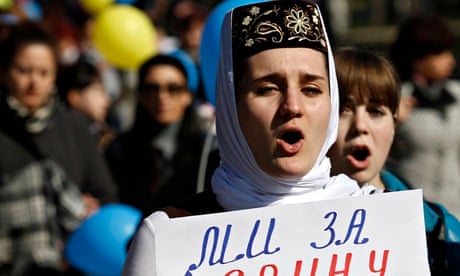Russia may be tightening its grip on Crimea, with little resistance to date, but they have yet to face the Crimean Tatar factor.
There are 266,000 Crimean Tatars in Crimea, over 13% of the local population. They are Sunni Muslim, traditionally pro-Ukrainian, and much better organised than the local Ukrainians, who make up 23% of the population.
A quick look at history tells you why: Stalin deported the Crimean Tatars en masse to Central Asia in 1944, and half of them died during or after the journey. They were only able to return after 1989; by which time their homes had gone and their culture had been erased.
The Crimean Tatars are still economically marginalised, with constant tensions over land-squatting and 'irregular constructions' (shanty towns).
But Crimea is their only home. Turkey hosts a large diaspora; but the peninsula was home to the Crimean Tatar Khanate from 1441 to 1783. The roots of Christianity in Crimea go back more than a thousand years; but the idea of Crimea as an ancient outpost of Orthodox Christianity is really only 160 years old, dating back to a programme of church-building to replace local mosques after the Crimean war of 1853-56.
The Crimea that a young Leo Tolstoy saw during his army service was still Muslim in many parts.
At rallies last month, the Crimean Tatars were chanting both "Allahu Akbar" in Arabic and "Glory to Ukraine" in Ukrainian. At the time, there was an outside chance of a Crimean regional government supported by the Crimean Tatars, some Ukrainians and local elites who resented the rule of Viktor Yanukovych's clique., which is why Russia then intervened to put its supporters in power instead.
So in less than a week, the Crimean Tatars have gone from being heroes of the revolution to an isolated minority. Their leaders are advising them to stay indoors, but there are also reports of Tatars forming self-defence units.
The Crimean Tatars have been well organised since the 1960s. They have their own would-be parliament, the Qurultay, which revamped its voting system last year after an internal debate on accountability, introducing some proportional representation.
Most religious organisations belong to the allied Spiritual Directorate of Muslims of Crimea (DUMK), which has close links to official Islam in Turkey. Radical Islam exists, but has largely been kept to the fringes by the DUMK to date.
Now the Crimean Tatars fear these organisations will be suppressed in a Russian-controlled Crimea. Since Yanukovych's election in 2010, the Qurultay and its smaller executive body, the Mejlis, have been squeezed out of official organs and forced to compete with new radical parties, allegedly sponsored by the authorities in both Kiev and Moscow.
The Mejlis may be replaced by the small number of pro-Russian Crimean Tatars, who have been dubbed the "Kazany", because they are always saying life is better for the Volga Tatars in Kazan, capital of the Russian Republic of Tatarstan.
The veteran leader of the Mejlis, Mustafa Cemiloğlu, has recently retired after a long career advocating peaceful protest. His successor, Refat Chubarov, follows a similar line.
But since 2010, there has been a rising number of clashes over land, the desecration of graves and monuments, and fights over market trading rights with local mafia groups. The seventieth anniversary of the 1944 deportation will fall this May. The idea had been to hold an international conference on the Crimean Tatar problem; now it looks likely to be the key flashpoint.
If the Crimean Tatar problem explodes, the blowback for Moscow will be immense. Russia's relationship with Turkey is already under threat. Its reputation as a friend of Islam in the Middle East will be damaged.
Russia has millions of Muslims of its own, the vast majority of whom are Sunni, including next door in the North Caucasus. Historically, the Crimean Tatars had close ties with the Circassians, who were driven from the Sochi area in 1864. And one reason why Putin has invested so much in backing Assad's Alawite regime in Syria against the Sunni majority was his fear of Sunni unrest at home.
Andrew Wilson is reader in Ukrainian Studies at UCL and the author of The Ukrainians: Unexpected Nation

Comments (…)
Sign in or create your Guardian account to join the discussion